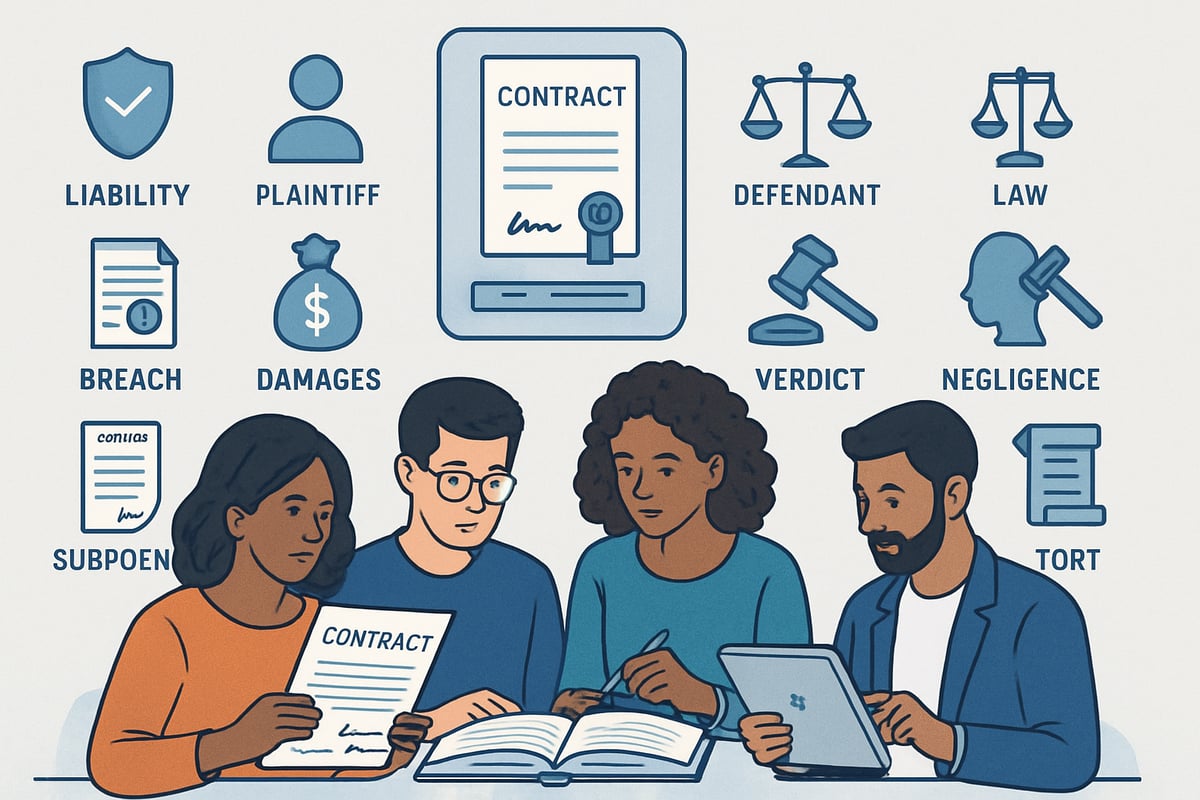Mastering legal terms english is more important than ever for global communication in 2025. Legal language shapes our daily lives, from signing contracts to accepting online agreements. If you want to confidently read, discuss, or negotiate legal documents, building this vocabulary is essential.
In this article, you'll discover the 12 must-know legal terms every English learner should understand. We'll break down each term, explain why it matters, and show how to spot them in real-life situations. Ready to unlock a new level of confidence and clarity in legal English? Let's get started.
The Importance of Legal English in 2025
The Globalization of Law and Business
As the world becomes more interconnected, understanding legal terms english is now essential for professionals in every industry. Cross-border transactions, remote work, and global partnerships are driving a surge in international contracts and negotiations. Legal English acts as the common language, ensuring clarity and minimizing misunderstandings between parties from different countries.
As the world becomes more interconnected, understanding legal terms english is now essential for professionals in every industry. Cross-border transactions, remote work, and global partnerships are driving a surge in international contracts and negotiations. Legal English acts as the common language, ensuring clarity and minimizing misunderstandings between parties from different countries.
For instance, multinational companies often require employees to interpret complex documents written in legal terms english. A single misinterpretation can result in costly errors or disputes. In fact, over 70% of global contracts are drafted in English, underscoring its dominance. To thrive in this environment, mastering legal English is now a must-have skill for anyone involved in international business or law.

Challenges English Learners Face with Legal Terminology
Learning legal terms english can feel like navigating a maze. Legal vocabulary is often very different from everyday English, with words carrying unique or specialized meanings. Literal translations rarely work, and context is everything. For example, the word "consideration" in the legal field means something entirely different than in casual conversation.
Why Mastering Legal Terms Matters for Learners
Gaining confidence with legal terms english is vital for academic study, business success, and personal protection. When you understand these terms, you're less likely to sign unfair agreements or miss critical information in contracts.
12 Must-Know Legal Terms for English Learners in 2025
Mastering legal terms english is essential for anyone looking to confidently navigate legal documents, contracts, and real-world situations. Let's break down 12 critical legal terms english learners should know.

1. Contract
A contract is a legally binding agreement between two or more parties. In the context of legal terms english, a contract forms the backbone of business deals, employment, and service arrangements. Every contract must include elements such as offer, acceptance, consideration (something of value), and mutual intent to create legal relations.
2. Liability
Liability means being legally responsible for one's actions or omissions. This legal terms english concept comes up in both civil and criminal cases. Civil liability usually involves paying damages, while criminal liability may result in penalties or jail time.
3. Plaintiff
The plaintiff is the person or party who initiates a lawsuit in civil court. In legal terms english, knowing who the plaintiff is helps clarify who is bringing the complaint and who must respond.
4. Defendant
A defendant is the person or entity accused or sued in court. In legal terms english, the defendant is the party that responds to the plaintiff's complaint.
5. Jurisdiction
Jurisdiction refers to a court's authority to hear and decide a case. In legal terms english, there are several types: territorial (location-based), subject matter (type of case), and personal (specific people or entities).
6. Damages
Damages are monetary compensation awarded to someone for loss or injury. In legal terms english, damages can be compensatory (to cover actual loss), punitive (to punish wrongdoing), or nominal (symbolic).
| Type | Purpose | Example |
|---|---|---|
| Compensatory | Cover actual losses | Medical bills, lost wages |
| Punitive | Punish wrongdoing | Additional penalties for malicious acts |
| Nominal | Symbolic recognition | $1 for rights violations |
7. Indemnity
Indemnity is a legal obligation to compensate someone for loss or damage. This legal terms english concept appears frequently in contracts and insurance policies.
8. Waiver
A waiver is the voluntary relinquishment of a known right. In legal terms english, waivers are common in contracts and legal settlements.
9. Force Majeure
Force majeure refers to unforeseeable circumstances that prevent someone from fulfilling a contract. This legal terms english concept covers events like natural disasters, wars, or pandemics.
10. Arbitration
Arbitration is a method of resolving disputes outside of court. In legal terms english, arbitration clauses are common in consumer contracts and employment agreements.
11. Breach of Contract
A breach of contract occurs when one party fails to fulfill their obligations under a contract. This legal terms english concept is central to contract law.
12. Confidentiality
Confidentiality refers to the obligation to keep certain information private. In legal terms english, confidentiality agreements protect sensitive business information.
Conclusion
Understanding these 12 legal terms english concepts will give you a solid foundation for navigating contracts, agreements, and legal documents. Remember, legal literacy is a skill that improves with practice and continued learning.
Start by identifying these terms in your daily life - in app terms of service, employment contracts, or rental agreements. With this knowledge, you'll be better equipped to protect your rights and make informed decisions.